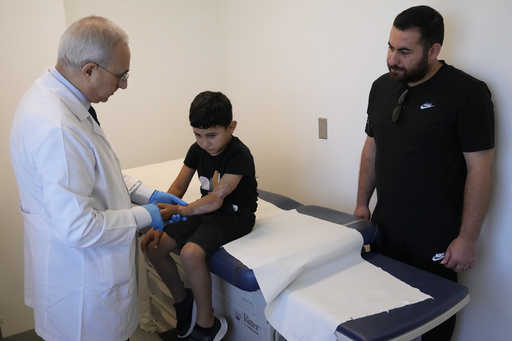
BEIRUT — Upon arriving in Beirut for her daughter’s surgery, Zarifa Nawfal was eager to visit the sea, a symbol of the life they left behind in Gaza amidst the turmoil. “The moment I smelled the sea, I felt at peace inside — as if I were in Gaza,” she expressed. However, her initial sense of tranquility quickly shifted to sadness as the reality of their circumstance sank in.
Nawfal’s daughter, Halima Abou Yassine, only seven years old, is among the many severely injured Palestinian children who have been brought to Lebanon this year for medical care. This program was initiated by Dr. Ghassan Abu Sitta, a surgeon with British-Palestinian roots. However, the complexities of their new environment have been heightened by Lebanon’s own emerging conflict, leading to fears of devastation similar to what is occurring in Gaza.
In February, Nawfal was staying in an apartment in central Gaza with her five children and her mother, having been displaced from their original home. During this time, her husband was unaccounted for, presumed dead. One day, as the children gathered water outside, a missile struck. Nawfal recounted the horror as she found Halima lying in the street, gravely injured with a fractured skull.
In the chaos, Nawfal felt a twinge of relief that Halima’s body was intact, contrasting the grim reality of many in Gaza who faced incomprehensible loss without even a body to mourn. Tragically, her son was unconscious beside her. Hospital staff later confirmed her worst fears—Halima had been declared dead and was placed in the morgue.
However, the family’s sorrow turned into astonishment when the little girl’s uncle detected faint signs of life just as preparations for her burial were underway. While officials from Al-Aqsa hospital could not be reached for confirmation, Dr. Abu Sitta acknowledged that such misidentifications could occur amid the relentless influx of casualties and limited hospital resources.
Nawfal devoted herself to her daughter’s care during those harrowing days, performing manual resuscitation until Halima could breathe independently. It was a remarkable recovery that some doctors even described as miraculous.
Yet despite the initial success, Halima’s injuries were severe, requiring extensive medical intervention. The family eventually made their way to Egypt in May, and by July, they arrived in Lebanon.
As the first wounded children from Gaza began arriving in Lebanon, they faced a backdrop of growing regional tensions. Adam Afana, a five-year-old who had suffered serious injuries and lost family members in an explosion, was among the initial wave. By October 2023, conflicts between Israel and Hezbollah threatened to escalate, creating a precarious situation for both new arrivals and local residents.
Dr. Abu Sitta chose Lebanon for this medical program due to its medical specialists experienced in treating war injuries, prompted by the country’s long history of conflict including a civil war and confrontations with Israel. “Even after the end of the wars, the wounded from Iraq and Syria would come here for that complex treatment,” he noted.
In July, Halima successfully underwent surgery at the American University of Beirut Medical Center. While she displayed improvements, including moments of joy as she adapted to life in Beirut with other children, the ongoing tensions in Lebanon quickly brought back distressing memories. As airstrikes resumed in mid-September, the children instinctively returned to survival behaviors—closing windows and seeking shelter away from exposed areas.
Despite offers to relocate for further medical care, Nawfal firmly rejected the notion. “Lebanon isn’t just another Arab country or a country we came to for treatment — Lebanon is a sister to Gaza,” she declared. This sentiment was echoed by Adam Afana’s uncle, who expressed fears that the unfolding violence in Lebanon resembled the beginning of the devastation witnessed in Gaza.
With the escalation of violence, the Ghassan Abu Sitta Fund has ceased bringing additional wounded children into Lebanon but continues to provide care for those already there. Adam’s treatments have included surgeries and regular physical therapy, yet his essential muscle transfer surgery remains stalled due to the regional turmoil.
Amidst these challenges, Dr. Abu Sitta has shifted focus towards treating local Lebanese children, as the urgent need for medical care grows. Despite fewer casualties in Lebanon compared to Gaza, he noted that injuries were strikingly similar, reflecting the grim reality of war—one that disproportionately impacts children. “As in Gaza, this war takes its toll on children,” he asserted. “All wars are waged on children.”
